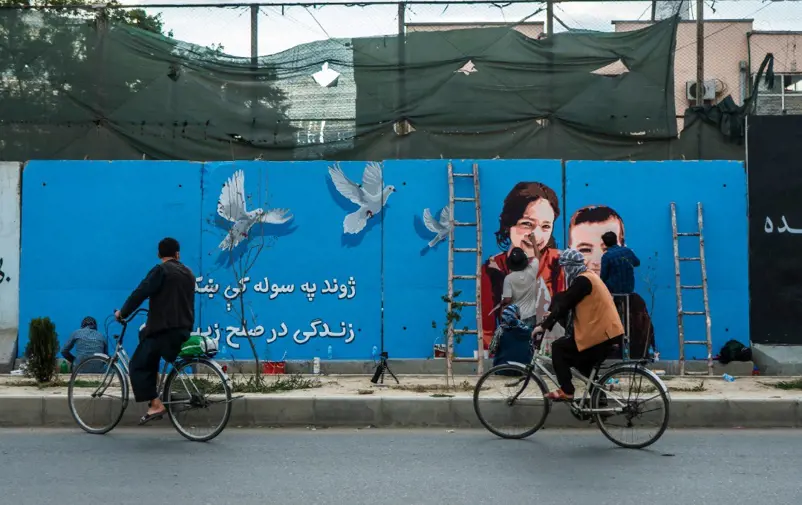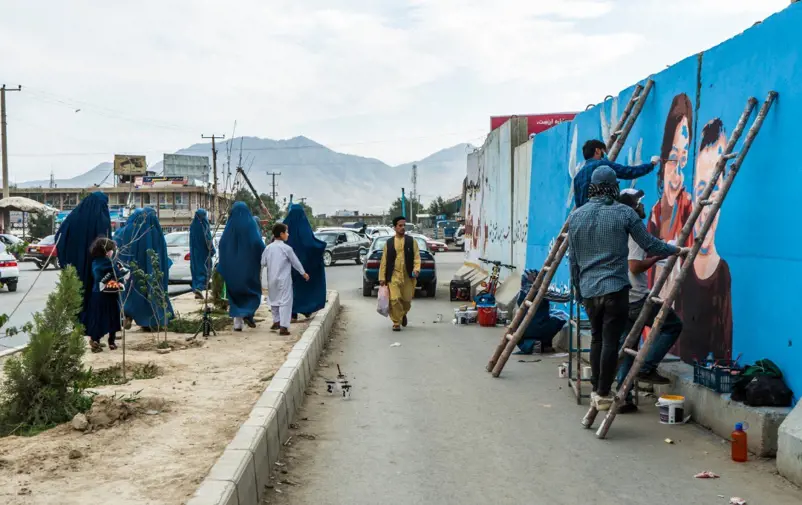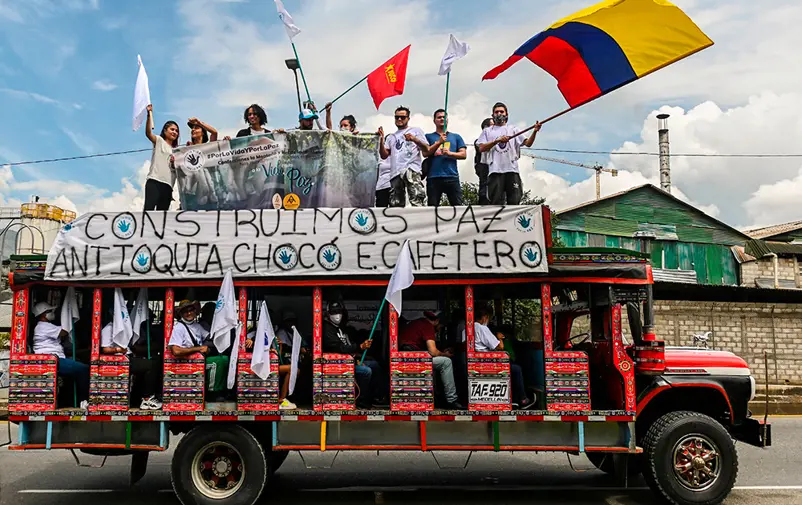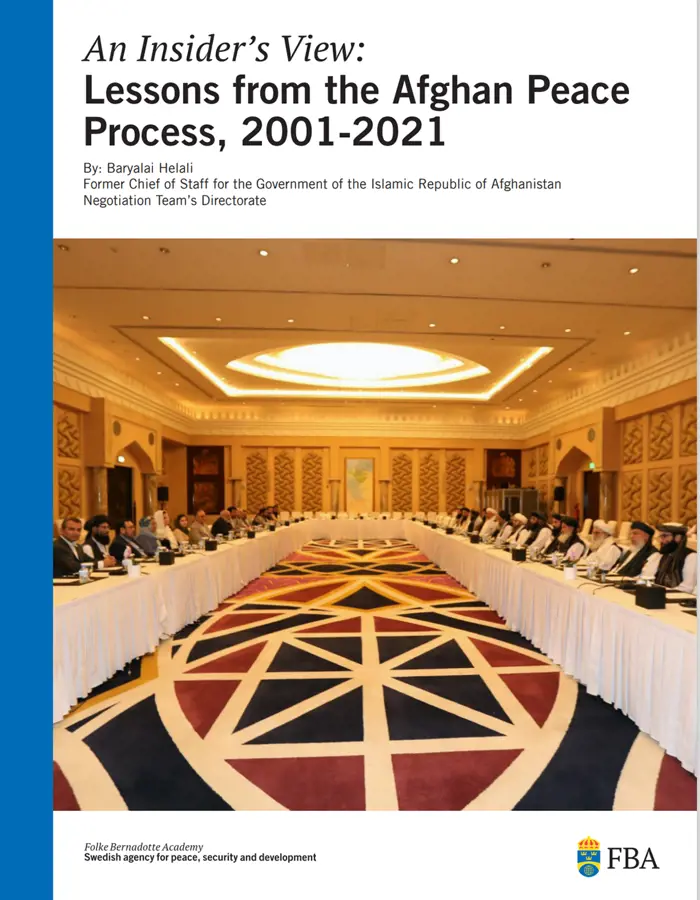Making the voices of the Afghan people heard in the peace talks between the Taliban and the government
Historic peace talks between the government of Afghanistan and the Taliban movement have just begun. But how will the voices of the Afghan people be brought to the negotiation table? A new platform, run by the Afghan civil society with practical support from the FBA and funding from the EU, will bring together the concerns and desires of the Afghans, and transmit them to the negotiators.Negotiations between representatives from the Afghan government and from the Taliban movement, which lies behind a long-lasting armed rebellion against the government, recently started in Doha in Qatar.
– The talks were postponed for months, because of some issues that needed to be solved, and because international travel is made more difficult by the coronavirus outbreak. But on 12 September the negotiations finally began, says Cecilia Hull Wiklund, project manager for the FBA’s work in Afghanistan.
The agency is commissioned to contribute to Sweden’s development cooperation with Afghanistan. Together with the Swedish International Development Cooperation Agency, Sida, the FBA is implementing an EU project in Afghanistan since the summer of 2019. The project, called the EU Afghanistan Peace Support Mechanism, is intended to strengthen the voices of the Afghan people in the ongoing peace process.
– The EU gave Sweden, a member state with a long-term engagement in Afghanistan, the responsibility to implement the project, which is funded by the EU. Sweden, through the FBA and Sida, is since carrying out various activities within the realm of the project, Cecilia says.
Sida allocates EU grants to Afghan civil society organizations, in order to support their peacebuilding efforts. FBA contributes by providing expert advice, for example on how to influence the design of the peace negotiations.
Sida and the FBA are also supporting Afghan civil society organizations in their efforts to create a platform for collecting the concerns, needs and positions of the Afghan people, and channel them to the negotiation table. The platform is called the Afghanistan Mechanism for Inclusive Peace, or AMIP.
The work is coordinated from the AMIP Secretariat in Kabul, funded by Sida and run with practical support from the FBA.
– For example, we share advice and our experiences from working with peace processes in other countries. But all activities carried out in Afghanistan of course have to be adapted to the Afghan context, Cecilia says.
– Representatives from various Afghan civil society organizations presented the idea of creating a joint platform, to efficiently collect and channel opinions on the peace process and the future of Afghanistan from different parts of Afghan society. They turned to the EU for support, and AMIP is now an important part of the EU’s collective effort for an inclusive peace process in Afghanistan, says Eldridge Adolfo, senior dialogue and peace mediation adviser at FBA.
The creation of AMIP and the establishment of its secretariat has been a work in progress, going on for the last months. Now, when the work of the platform is going full steam ahead, AMIP is being publicly launched and introduced to a broader audience.
– There are many civil society organizations in Afghanistan, in different parts of the country. They are fighting for women’s or youths’ rights, for example, or raising awareness of the situation of ethnic minorities. At the moment, AMIP is collecting views on the peace process from all those organizations, Cecilia says.
When a specific issue will be discussed in the peace talks, AMIP will then be there to present the views of the people.
– It would be impossible to summon thousands of different people to the negotiation table. Instead, AMIP will be at the table to summarize the opinions delivered by the Afghan people, and to neutrally present the priorities of the people. This will make it easier for the negotiating parties, and give more weight to the opinions of the people. Of course, it may be a complicated task for AMIP, since different groups of the population may have conflicting views. The role of the representatives of AMIP will then be to depict the diversity of opinions, and at the same time remind the negotiators of the principles of international law and core human rights obligations, Eldridge says.
A document summarizing the results from consultations with representatives from over 150 Afghan civil society organizations has already been made public by AMIP. The document states that the Afghan people wants to see a permanent ceasefire agreement, and that human rights for all – also for marginalized groups in the Afghan society, such as women, youth and ethnic minorities – must be guaranteed at the same time.
– During the last years, women and minorities in particular have gained more rights. Large parts of the Afghan population now fear that the Afghan government will agree to limit those hard-won rights, in order to reach an agreement with the Taliban, Cecilia says.
The background to the peace talks is long and complicated. The Afghan people, currently estimated at 35–39 million individuals, have been plagued by war since 1979 when the Soviet Union invaded the country to fight the Islamist rebel movement that had emerged in protest against the communist regime ruling Afghanistan, with Soviet support.
It ended by Islamist victory. The Soviet troops withdraw in 1988, and the communist regime in Afghanistan was overthrown in 1992. A violent civil war followed between different Islamist fractions. The hardline Taliban emerged victorious in 1996. During their rule, large-scale human rights violations took place, and the terrorist group Al-Qaida was allowed to operate from Afghan soil.
Then came the 11 September terror attacks in the US, orchestrated by Al-Qaida. The Taliban’s refusal to hand over al-Qaida’s leader Osama bin Laden to the Americans, led to an invasion of Afghanistan by the US and its allies. The Taliban regime was overthrown, an interim government was installed, and democratic elections were eventually held.
Since 2006, Afghanistan has been ruled by an elected government supported by the US. But the Taliban have continuously been attacking the government and its supporters, and currently some 40 percent of the Afghan territory is controlled by the Taliban. Despite the difficult security situation, large numbers of foreign troops were withdrawn from Afghanistan in 2014, but American troops remain.
– However, the US and the Taliban agreed in February this year that all US troops will be withdrawn from Afghanistan next summer. In return, the Taliban promised to start negotiating with the Afghan government. That is the backdrop of the peace negotiations taking place now, Cecilia says.
In the first negotiation plans, the voices of the Afghan civilian population were not being taken into account.
– This is when the Afghan civil society stepped in and demanded their place in the process. With support from the EU, FBA and Sida, we now hope that AMIP will be given a formal role in the peace process as a mouthpiece for the Afghan people. It is time for the voices of the ordinary Afghans to be heard.
Photo: Artists from the Afghan grassroots movement Artlords painting murals with messages about peace in the streets of Afghanistan.









 >
> >
>

